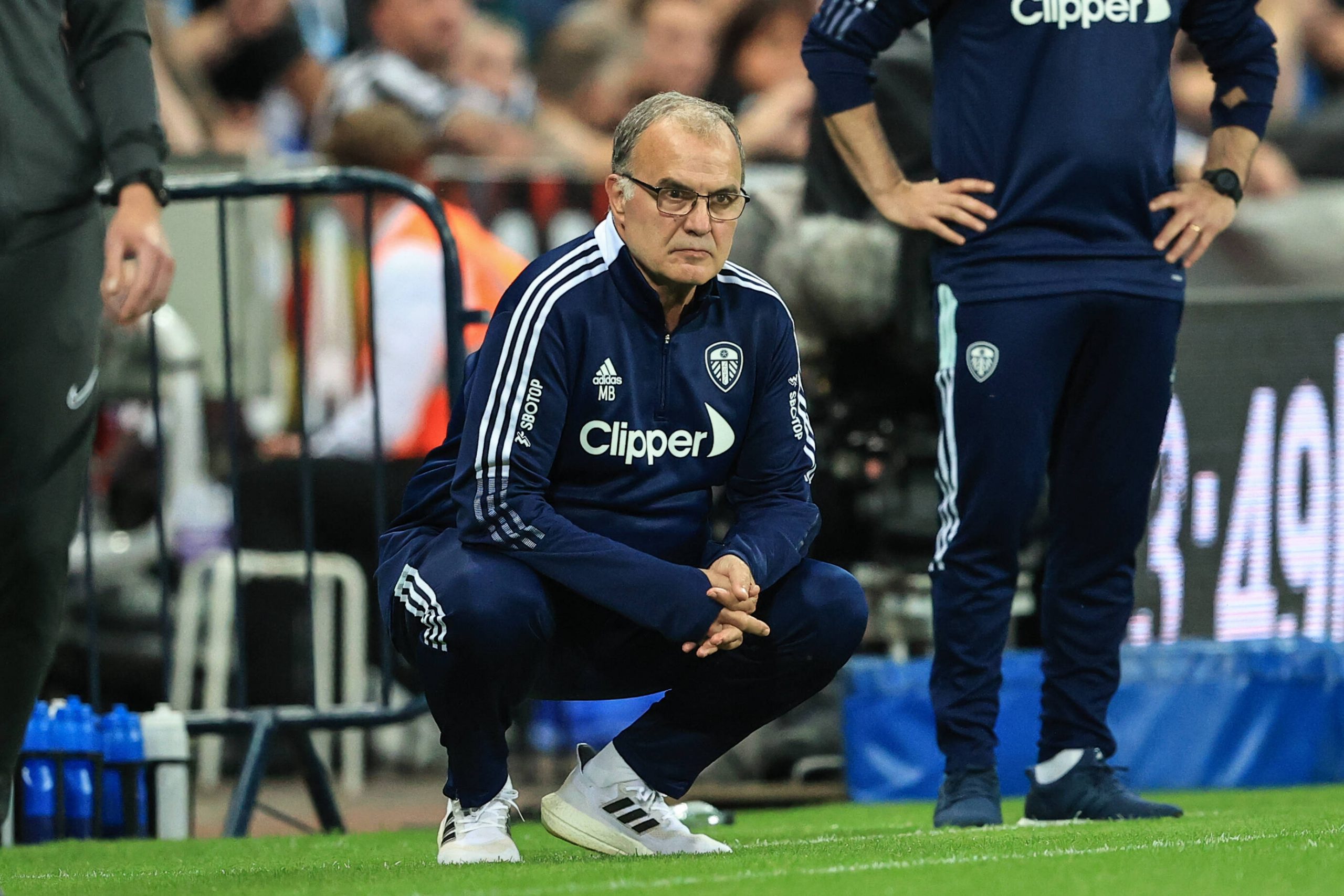Walk through Leeds city centre and there are mementoes everywhere that show Marcelo Bielsa is not just any old football manager. There are murals on display and streets named after him, proving that he was more a cultural phenomenon.
A maligned, misunderstood coach, nicknamed ‘El Loco’ (crazy) for his obsessive approach to football and unorthodox methods, met the most notoriously difficult English club in 2018. It could have gone so wrong; Bielsa’s history, his most ardent critics believed, suggested it would eventually. But sparks flew.
Since 2004, everybody has become aware of Leeds United’s story. One of the proudest and biggest football institutions in this country, which had won league titles and played in Europe until only a couple of years before, hit financial oblivion and were relegated from the Premier League. For much of the next 16 years, further bad decisions and poor management exacerbated their malaise and they drifted through the lower leagues, even succumbing to administration. Different owners and managers had all tried and failed,, but it was the marriage with Bielsa, which on paper appeared quite awkward, which finally brought everything together and Leeds back to the top flight.
The Argentine was known for his high-intensity style, demanding incredible fitness from his players, and making his teams very attack-minded. Traditionalists thought it could never work in England, but Leeds are one of those clubs that feel different; a one-city club who, when guided a certain way, can be galvanised. That is exactly what happened almost instantly during his first season, which ultimately ended in play-off defeat.
“Victories over Stoke and Derby in the Championship were as good as anything any Leeds fan had seen in years – if ever,” Nestor Watach, football writer for Planet Football and Leeds fan, tells Compare.bet. “Anyone under the age of 30 will have never seen anything like it, and older generations that remember the Don Revie and Howard Wilkinson years may well have given up on seeing anything like that again.
“I’m sure promotion would’ve felt amazing if we’d been incredibly boring and done it under Neil Warnock or something, but it did feel extra special because of Bielsa. It feels like the only way it could have been done – I maintain there’s not another coach in the world, not [Jurgen] Klopp or [Pep] Guardiola, that could have inherited that squad and transformed them as he did.
“Being his club and playing football in his image was a badge of honour – something that Leeds fans share with Newell’s Old Boys, Chile and Athletic Bilbao.”
The biggest reason Bielsa and Leeds had such a strong bond was because one relied upon the other to reignite their love for football, importing meaning back into their trips to Elland Road.
“Prior to Bielsa’s arrival, after eight years of largely midtable Championship finishes with totally forgettable teams and seasons. Many just kept going to Elland Road out of some kind of habit, but it was rarely a fun place to be and it certainly never felt like the club was going anywhere – put simply, because it wasn’t.”
But there was a human connection between Bielsa and his people, too. He was eccentric, but the sense of community and remaining grounded shone through; he lived among fans, shopping in the local supermarket and walking in the area and to training, never shirking the opportunity to make somebody’s day with a photo or an autograph. What struck hardest during his near four-year reign, which eventually came to an end earlier this month, was that everybody seemed to have a Bielsa story.
Supporter James Rowlands tweeted about supplying Bielsa with his favourite tea and biscuits and leaving them on the door handle of his flat. He received a personal ‘thank you and goodbye’ message before they parted ways.
For 3 years I have brought Marcelo his favourite tea and biscuits from Argentina 🇦🇷 & Chile 🇨🇱. I always left them on the door handle of his flat, knocked and left. Today he called at my house to say thank you and goodbye. It meant the world to me. Adios amigo 👋🏻 #lufc #bielsa pic.twitter.com/sHCBmoclWK
— James Rowlands (@JamesMRowlands) February 28, 2022
“The football was a joy to watch and the players looked like they actually cared. So it was so easy to buy into,” Watach continues. “That’s the coaching – but there’s also his humility, his honesty, his inherent likability, and the sense that he genuinely, truly cared about the club and supporters.
“He spoke about feeling that love, which will have certainly helped. But there was also the fact that chairman Andrea Radrizzani and director of football Victor Orta were willing to accommodate his idiosyncrasies and demands – such as a large coaching staff and changes to the training facilities.
“It proved worth it, but you can’t imagine many football club owners giving the head coach that degree of autonomy in this day and age.
“There was no intentionally projecting an everyman image – he really is that humble and down to earth. He would always have time for the supporters he met, and would stress when asked about posing for photographs that it was nothing to do with him being Bielsa, but rather “the manager of Leeds United” – a custodian role he took seriously.”
There was an outpouring of emotion akin to grief since the decision was made to sack him. Leeds’ first season back went extremely well, with a ninth-placed finish, but terrible luck with injuries, and perhaps a stubborn refusal to change his ideals when results weren’t going their way from Bielsa, cost him as they hovered precariously above trouble.
So did the fans ultimately understand the board’s decision?
“It’s been a big debate within the fanbase. From my own experience talking to fans and browsing social media, I would say the vast, vast majority are unhappy with the decision from the club – and now the hierarchy has no one to hide behind.
“That’s not to say that most wouldn’t recognise the cold, hard logic of the decision. Ultimately owners need to protect their assets and they will make a decision that will save a club from relegation. In Bielsa’s final weeks, Leeds were dovetailing and defensively shambolic.
“I personally have faith he would have kept us up and plenty in the fanbase share that view. There was always a fear that his tenure would end like this, though, because he’s such a beloved figure that he deserved the right send-off – at the end of the season, with fans able to give him a proper thank you for transforming the club.”
Jesse Marsch – the former Red Bull Salzburg coach – has come in and attempted to take the club forward. It must feel like a step-parent moving in for many fans, but Watach says results can endear him.
There has been a first win in nine games, against Norwich last weekend, which have eased very realistic relegation fears, but he started with successive defeats and losing to Aston Villa in particular, in his first home game, led to questions over whether trading the entire Bielsa experience was worth it.
“It seemed like we’d instantly lost everything that made us special under Bielsa. It felt like we’d lost part of our soul, of our identity, whereby you instantly understood why fans of his former clubs dub themselves ‘the widows of Bielsa’.
“He is a hard act to follow – particularly technically, in terms of the players unlearning the very unique man-marking style.
“But using some his hallmarks – optimum fitness, aggressive pressing, quick and vertical interplay – and refining them into something a bit more conventional could well be what’s best for Leeds in the medium-to-long term. Look at how Chile and Athletic Bilbao did after the foundations he’d left.
Life moves on and so must Leeds. There is a new chapter after the most amazing of eras, and everybody will look forward knowing they have a lot to thank one man for.
“Ultimately, Leeds will always be Leeds, and hopefully Marsch can keep Bielsa’s legacy intact,” Watach concludes. Joe Gelhardt’s vital last-minute winner against Norwich sparked absolute pandemonium in the stands at Elland Road – it’s been years since the fans celebrated a goal like that, given the promotion run-in was played behind closed doors and this season so far hasn’t been much fun.
“When you celebrate a goal like that, you’re reminded that Leeds can definitely still be fun – even without Bielsa, hard as that was to believe in the immediate aftermath of his sacking.”








